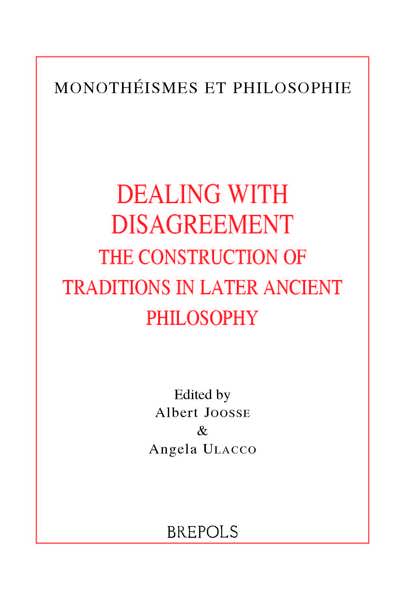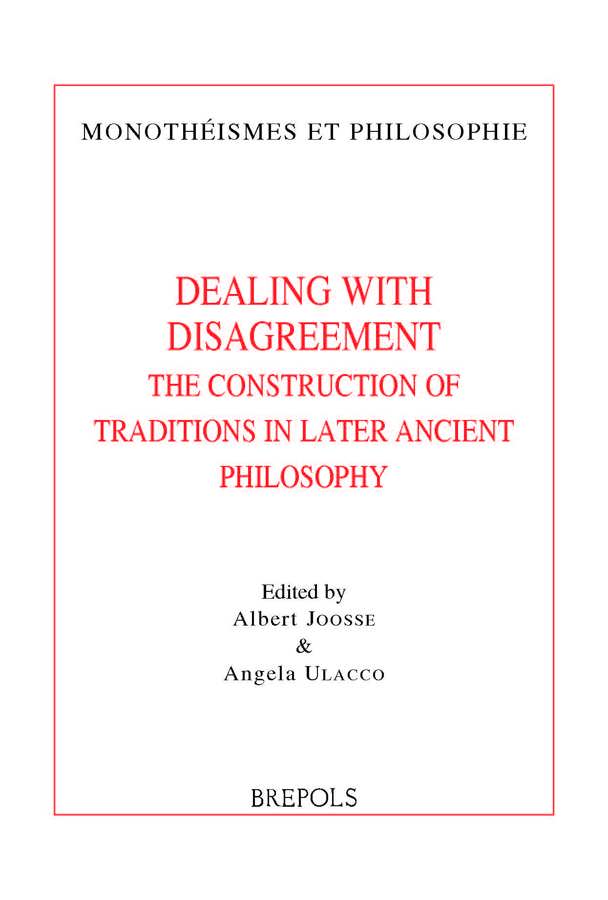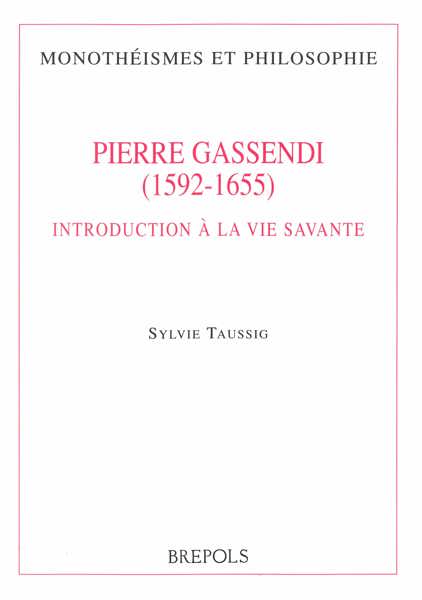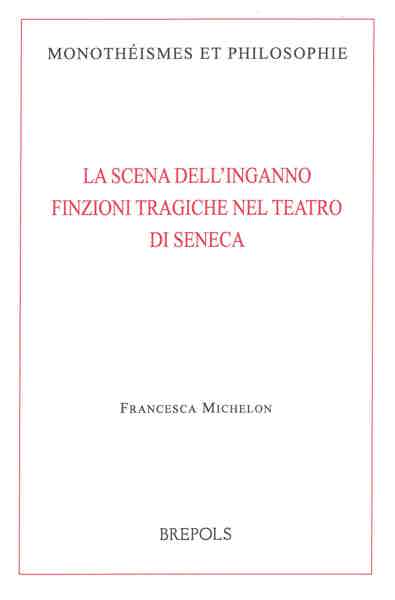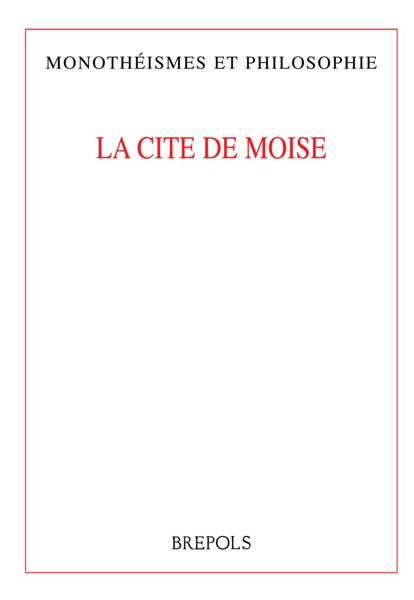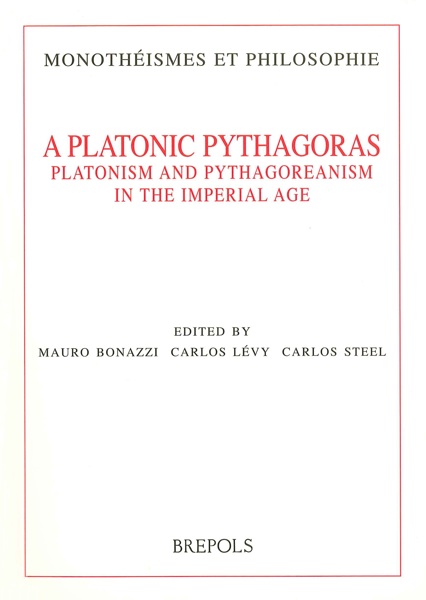
Dealing with Disagreement
The Construction of Traditions in Later Ancient Philosophy
Albert Joosse, Angela Ulacco (eds)
- Pages: 234 p.
- Size:156 x 234 mm
- Language(s):English, French, German
- Publication Year:2023
- € 50,00 EXCL. VAT RETAIL PRICE
- ISBN: 978-2-503-60284-4
- Paperback
- Available
- ISBN: 978-2-503-60285-1
- E-book
- Available
This book treats both Christian and non-Christian texts from the first century BCE to the sixth century CE, and suggests that dealing with disagreement helped philosophers define their own traditions while creating a conceptual common ground.
“To sum up, Dealing with Disagreement significantly enriches our understanding of the construction of philosophical traditions through the lens of intellectual disagreement. By focusing on how ancient thinkers from various traditions engaged with dissenting opinions, the project sheds light on the dynamic process of tradition-building within both pagan and Christian intellectual contexts. It offers a nuanced exploration of how disagreements influenced the development of doctrines, stimulated philosophical advancements, and shaped the identities of competing intellectual communities. Collectively, these essays reveal that conflict and critique were not mere obstacles to consensus but were pivotal in fostering a deeper engagement with philosophical issues and in promoting a richer, more diverse intellectual landscape. By examining the interplay between different schools of thought, the volume not only enhances our understanding of ancient philosophical methods and concerns but also highlights the importance of intellectual diversity in the evolution of philosophical ideas.” (Melpomeni Vogiatzi, in Bryn Mawr Classical Review, 29/08/2024)
« L’ensemble met en lumière, au-delà des dissensions étudiées, des traditions philosophiques et des pratiques communes, puisque, comme le souligne Hauer, l’expression de divergences est souvent une occasion de critique constructive. (...) Les études sur les interactions entre différentes écoles et entre philosophes et Chrétiens sont assez rares, de sorte que cet ouvrage est tout à fait bienvenu, et pour le spécialiste de l’Antiquité tardive et des débuts du christianisme, et pour l’historienne des idées. » (Mathilde Cambron-Goulet, dans Anabases. Traditions et Réceptions de l'Antiquité, 41, 2025, p. 392)
Albert Joosse is a lecturer in ancient philosophy at the University of Groningen. He has published on Platonism, especially the Alcibiades I and its reception. He has recently edited Olympiodorus of Alexandria (Brill, 2021).
Angela Ulacco was Juniorprofessor for Greek Philosophy at the University of Freiburg and is currently a researcher at the KU Leuven. Her research focuses on the Pythagorean and Platonic traditions. She is the author of Pseudopythagorica Dorica (De Gruyter, 2017).
Ancient philosophy is known for its organisation into distinct schools. But those schools were not locked into static dogmatism. As recent scholarship has shown, lively debate persisted between and within traditions. Yet the interplay between tradition and disagreement remains underexplored. This volume asks, first, how philosophers talked about differences of opinion within and between traditions and, second, how such debates affected the traditions involved. It covers the period from the first century BCE, which witnessed a turn to authoritative texts in different philosophical movements, through the rise of Christianity, to the golden age of Neoplatonic commentaries in the fifth and sixth centuries CE.
By studying various philosophical and Christian traditions alongside and in interaction with each other, this volume reveals common philosophical strategies of identification and differentiation. Ancient authors construct their own traditions in their (polemical) engagements with dissenters and opponents. Yet this very process of dissociation helped establish a common conceptual ground between traditions. This volume will be an important resource for specialists in late ancient philosophy, early Christianity, and the history of ideas.
Albert Joosse and Angela Ulacco — Introduction
Riccardo Chiaradonna — The Early Peripatetic Interpreters of Aristotle’s Categories and the Previous Philosophical Tradition
Franco Ferrari — È esistita un’eterodossia nel medioplatonismo?
Teun Tieleman — Galen on Disagreement: Sects, Philosophical Methods and Christians
Albert Joosse — Γνῶθι σαυτόν and the Platonic Tradition in Clement of Alexandria
Sébastien Morlet — L’accusation de mauvaise entente (παρακοή) dans la polémique entre païens et chrétiens à la fin de l’Antiquité
Robbert M. van den Berg — Plato’s Violent Readers: Pagan Neoplatonists against Christian Appropriations of Plato’s Timaeus
Helmut Seng — Mythenkritik und Kultpolemik bei Firmicus Maternus
Alexandra Michalewski — « L’âme est le lieu des formes » Une réponse à l’argument du troisième homme à travers la symphônia de Platon et d’Aristote dans le Commentaire à la Métaphysique d’Asclépius de Tralles
Mareike Hauer — The Use of Stoic References in Simplicius’ Discussion of Quality
Index
Bibliography
